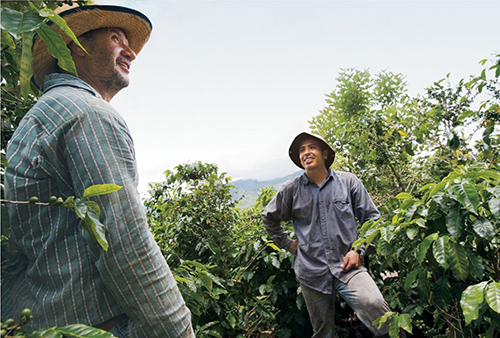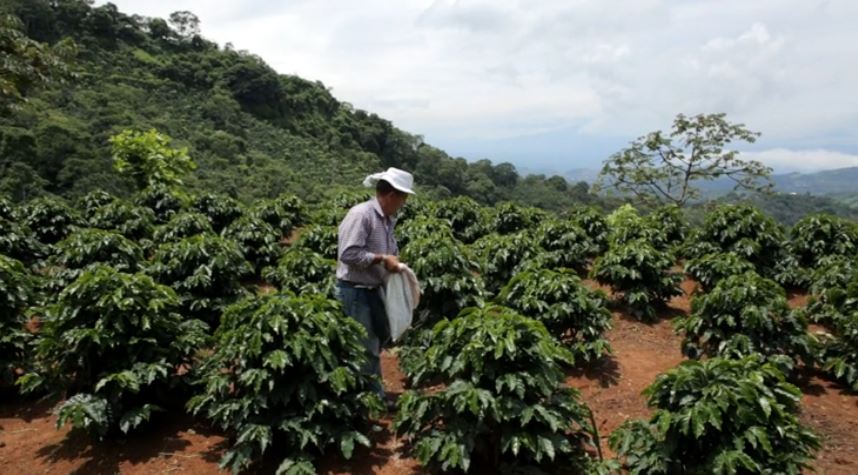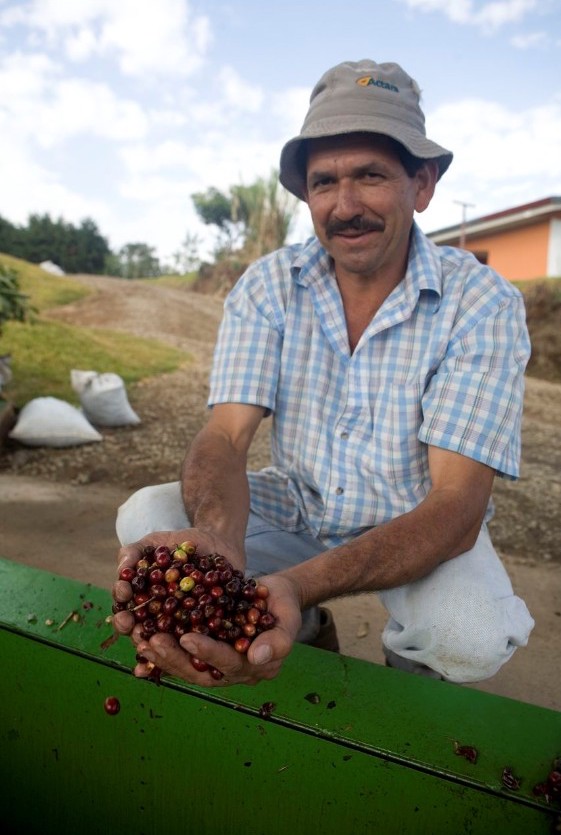Our Future in Sustainable Coffee
Starbucks is proud to have reached the milestone of 99 percent ethically sourced coffee.
However, we are not done yet. We will continue to work with that last 1 percent to bring producers along on this journey with us, like we do with Starbucks Reserve® Eastern D.R. Congo Lake Kivu coffee, where we are working with farmers to expand our ethical sourcing effort. We believe we can increase the prosperity and resiliency of 1 million farmers and workers who grow our coffee in coffee communities around the world. We will do this by investing in coffee communities, sharing our technical coffee knowledge and innovating with new approaches. Moving beyond our 100 percent ethically sourced commitment, we are joining with others to make coffee the world’s first sustainable agricultural product.
Investing in Farmers
Thanks to our partners and customers, more than 25 million trees have been donated to coffee farmers. This effort began in September 2015, when Starbucks launched the One Tree for Every Bag Commitment to help ensure the long-term supply of coffee and the economic future of coffee farmers. Its goal was to raise enough funds by the end of 2016 to plant 20 million coffee seedlings that will replace trees declining in productivity due to age and disease such as coffee leaf rust. With the help of our customers, we exceeded this goal in just over a year.
To build on that success, Starbucks will quadruple its commitment by providing 100 million healthy coffee trees to farmers by 2025 by leveraging our green coffee purchases in coffee-growing communities most impacted by climate change.
We will work in collaboration with Conservation International (CI) and our partners on the ground and will share what we learn across the industry, to ensure that other farming communities that need to replace their trees can benefit from this program.
The Starbucks Global Farmer Fund is a $50 million commitment to provide financing to coffee farmers. Through these loans, farmers have the ability to support agronomy, restoration and infrastructure improvements. This work directly influences coffee quality, sustainability and the economic benefit for the specialty coffee industry.
To support critical issues coffee communities are facing, the Starbucks Foundation partners with organizations with local expertise to build sustainable solutions. Since 2014 the Starbucks Foundation has awarded origin grants to support smallholder-farming families in coffee- and teagrowing communities, reaching approximately 47,000 direct and indirect beneficiaries. By 2020 the Foundation plans to reach 250,000 people.
In 2016 Starbucks began funding a new project in Oaxaca, Mexico, with Conservation International, focused on delivering a net positive model to reestablish coffee as a livelihood. Oaxaca was once a globally important origin for high-quality specialty coffee, but productivity has declined significantly due to climate change, lack of market access, poverty, migration and other challenges. CI will work with local partners to improve farmers’ shade-management systems and increase alternative income streams—with the aim of stabilizing farming communities in Oaxaca and enabling farmers to continue growing coffee. CI will also train producers in water conservation to protect freshwater resources and will work to ensure the active participation of women, indigenous farmers and their families.

Sharing Coffee Knowledge
Starbucks currently operates eight Farmer Support Centers in key coffeeproducing countries around the world, from Indonesia and Rwanda to our newest center in Mexico. Our open-source agronomy approach will give farmers in these regions free access to the latest findings of our top agronomists, including new varietals of disease-resistant trees and advanced soil-management techniques. Building on traditional growing methods will help farmers continue to improve both the quality and yield of their crops and help increase profitability, ensuring the future of high quality coffees for everyone. With this global network, we aim to train 200,000 coffee farmers by 2020.
Working with Others to Make All Coffee 100 Percent Sustainable
We know that greatest challenges in coffee can be solved faster if we collaborate and share solutions. That’s why Starbucks is one of the founding members of The Sustainable Coffee Challenge, a diverse industry coalition led by Conservation International with the call to action of making coffee the world’s first sustainable agricultural product. The Challenge began in 2015 at the United Nations climate talks in Paris and has grown to more than 60 members across the industry, including other roasters, non-governmental organizations and the governments of Mexico and Rwanda. The Challenge is now pulling together the industry precompetitively to develop innovative solutions to ensure the prosperity and well-being of farmers, workers and communities, sustained supply of coffee and conservation of nature. At Starbucks, we have an opportunity to partner with others and go beyond our own commitment of 100 million trees. Through the Sustainable Coffee Challenge, the industry is coming together to commit to 1 billion trees, while developing shared principles for responsible renovation. We invite our partners and customers to share the journey with us and to follow the Challenge at sustaincoffee.org.

Issuing Our First Sustainability Bond
In May 2016, we issued our first U.S. Corporate Sustainability Bond. The company will use the net proceeds from the offering of $500 million to enhance its sustainability programs around coffee supply chain management through eligible sustainability projects.
More than Coffee
We are committed to 100 percent ethically sourced tea and cocoa. To learn more about our commitment and progress, visit starbucks.com/social-impact.
Sustainable Coffee Goals
Sourcing Commitment
100% Ethically Sourced Coffee
Planting Trees
Provide 100 Million Trees to Farmers by 2025
Starbucks Global Farmer Fund
Invest $50 Million in Funding for Farmers by 2020
Open-Source Agronomy
Train 200,000 Coffee Farmers by 2020
